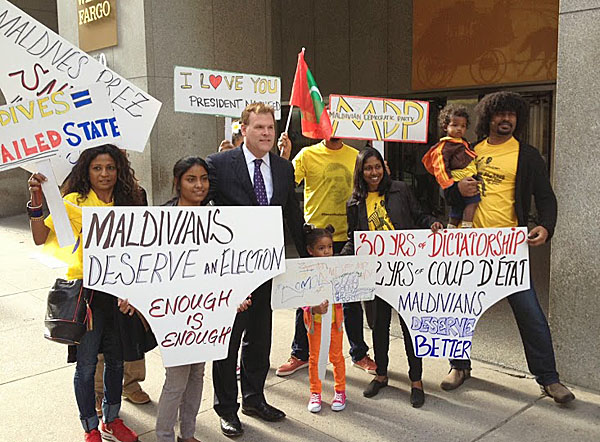New voters and voters who wish to vote from a location other than their home island must submit the NEW fingerprint re-registration form by 4:30pm Saturday October 12, in line with Thursday night’s Supreme Court ruling. People who re-registered prior to the Sept 7 election will need to complete the process again, or may be unable to vote. Fingerprint forms submitted on Oct 9-10 will still be valid.
Forms are available at all island council offices, Addu City Council departments, party offices, diplomatic missions and at www.elections.gov.mv. In Malé forms will be accepted at the Elections Commission’s registration center on Handhuvaree Hingun.
Check your registration by SMSing 1414 ‘VIS ID#’, call the hotline on the same number, or visit http://elections.gov.mv/index2715.html
The US has said it is “deeply concerned” about continued legal actions “that could further delay the Maldivian presidential election”.
The Supreme Court opened at midnight on Thursday in response to a petition from the Progressive Party of the Maldives (PPM), and ordered the Elections Commission to redo the entire voter re-registration process, despite previously ordering polls to be held before October 20.
Earlier in same day the PPM had sought to file another petition to bar former President Mohamed Nasheed from the polls on the grounds of him being “irreligious” and critical of the judiciary, although this appeared to stall following dissent within the party.
“It is important that the [election] go forward unimpeded in a fair, inclusive and transparent way,” said Deputy Spokesperson for the US State Department, Marie Harf, in a statement.
“The basis of any democracy is for citizens to choose their government, for political differences to be decided at the ballot box in an environment free of violence and for election results to be respected,” the statement read.
“We continue to urge a peaceful political process that is inclusive of all candidates in order to ensure the Maldivian election that will meet international standards of an elected, legitimate democracy,” it concluded.
The statement followed UK Foreign Secretary William Hague’s urging of presidential candidates “to act in line with the interests of the people of Maldives”.
“It is imperative that there are no further delays and the elections be free, fair and inclusive, and that international observers are invited,” the Foreign Secretary said.
“Cynical attempt to delay election”: MDP
Nasheed’s Maldivian Democratic Party (MDP) has meanwhile begun the task of re-registering tens of thousands of voters, in line with the Supreme Court order. Re-registration is required for new voters or people wishing to vote at a location other than their home island, with almost 65,000 people re-registering in the annulled first round – almost 30 percent of the voter turnout.
At the same time the MDP condemned Thursday’s ruling, warning that it risked further delaying the elections.
“The MDP is extremely concerned that the Supreme Court is interfering in the electoral process for political reasons, issuing unconstitutional rulings and acting with impunity,” said the MDP in a statement.
“The MDP fears that the PPM is seeking to delay the elections and also disenfranchise overseas and resort-based voters, who will now likely have to re-register and who tend to vote overwhelmingly in favour of President Nasheed,” the party stated.
“This is a cynical attempt by the PPM and the Supreme Court to prevent elections from taking place next week,” said the party’s spokesperson, MP Hamid Abdul Ghafoor.
“The PPM is running scared of the voters because they know they will lose a free and fair election., and the Supreme Court is facilitating the subversion of the democratic process.”
The party reaffirmed its confidence in the embattled Elections Commission, and called on security forces and the international community to ensure the Commission’s protection.
PPM MP Ahmed Nihan meanwhile told Minivan News last night that he believed the Supreme Court’s latest order would mean additional delays to the voting, currently scheduled for October 19.
